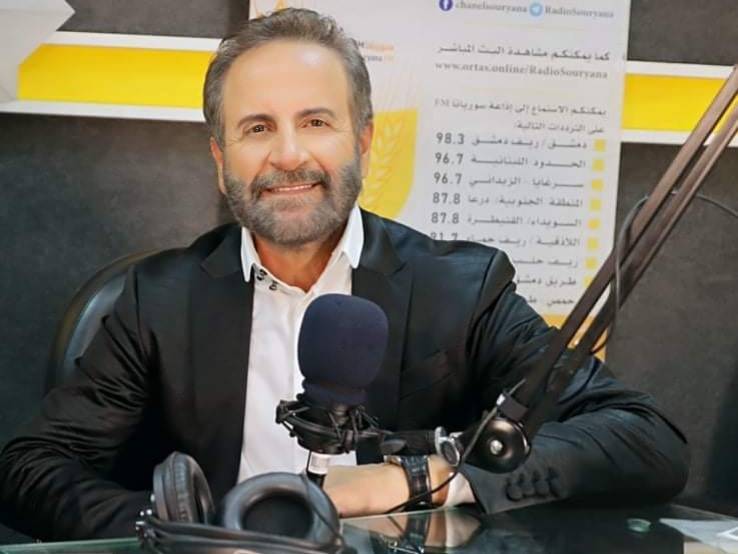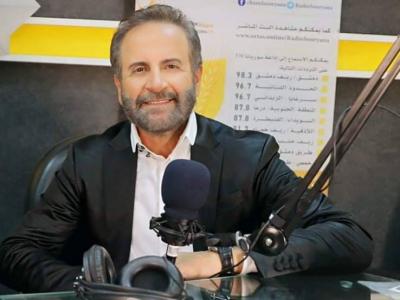Lebanese artist Ghassan Saliba affirmed that his commitment to art has reduced his opportunities for broader exposure, but it is his choice, as musical theater is the mother of arts. He added that he has minimized his appearances in music videos and solo performances in favor of musical theater.
In an interview during the VIP Dialogue program with host Dr. Yamen Dib on Souriana FM, Saliba expressed his preference for art that elevates standards and represents his country in the best possible light, noting that what he presents in musical theater is difficult to achieve in a solo song. He highlighted that musical theater addresses social, humanitarian, and political issues that matter to people and touch their daily lives.
Ghassan Saliba believes that musical theater alone is insufficient for a dignified life, but plays like "Al-Mutanabi" are still performed in several Arab countries and are in demand at opera houses in the Arab region. He called for these venues to maintain high standards in selecting works and confirmed that he has had solo appearances in Dubai, Qatar, Oman, and the UNESCO Theater.
The Lebanese artist revealed that his beginnings were in nightclubs and restaurants, but he no longer sings in these places as the nature of his songs does not fit the restaurant atmosphere, clarifying that he is not against artists performing in restaurants. Regarding the possibility of presenting a good theater work, Saliba stated that what is needed first is the end of the COVID-19 crisis, followed by the existence of production companies, a good theatrical script, and experts in this field. He stressed that Marwan, Ghadi, and Osama Rahbani are qualified, while Ghassan and Jad Rahbani also have the potential.
About Syrian theater, Saliba stated that we should not blame Syrian theater practitioners for the state of Syrian theater during the Syrian crisis, praising the success of Syrian drama in achieving accomplishments amid the ongoing war in Syria.
On the political positions of artists, Saliba said that an artist is not obliged to stand with one side against another; they belong to the people and are messengers of love, peace, and connection. However, they should be serious about crucial national issues and articulate the truth in their works, describing his song "Everything Changed" as a bold, significant, and patriotic work, emphasizing that national belonging is fundamental.
Regarding his solo songs, Saliba admitted that some succeeded while others did not receive their due success, holding production companies responsible while also taking a part of the blame for his preoccupation with theater. Concerning music videos, he confirmed that he has not focused on this medium due to his commitment to musical theater, hence has reduced his output of music videos and solo songs.
On talent shows, the Lebanese artist stated that they are beneficial and feature wonderful voices, especially from children who choose powerful heritage songs. He emphasized the necessity of an academy to support these children and help them continue their education so that fame does not lead to exploitation for financial gain.
Regarding the return of prominent artists to participate in the "The Voice Senior" program, Saliba mentioned that he sees no issue if an artist who has been absent for a long time decides to participate again, like Abdo Yaghi. However, he doubts his participation in such projects, considering that some jury members deserve to be on the panels with the necessary culture to convey ideas, while others do not.
He added that Syria lacks nothing for the Syrian song to thrive, and when asked who bears the banner of Lebanese song after the departure of the greats like Majida El Roumi, Julia Boutros, Pascal Saker, Assi El Helani, Melhem Zein, and Wael Kfoury, he mentioned their names.
Saliba justified his lack of participation in any film project by stating that the offers he received did not meet his ambitions and that cinema should address a national humanitarian issue. His participation in the series "And the Sun Shone" was due to the script resembling his personality, and it was a complete work that achieved unprecedented success.
He noted that while Lebanese drama is improving and developing, it lacks government support in Lebanon unlike Syrian drama, which is supported by the state, although he acknowledged that some Lebanese production companies produce works that rival Syrian companies.
He expressed his willingness to participate in joint drama works and Syrian drama, stating that what matters is not where an artist succeeds, but rather succeeding while correctly choosing songs that suit their voice and marketing them effectively.
Saliba hopes for the return of musical theater as it is a fundamental need and a mainstay that should persist. He believes musical theater is an artistic entertainment condition and maintains his dream that if he becomes a minister responsible for artistic affairs, he will build an opera house in his country.
On the project of presenting a play with Najwa Karam, Saliba confirmed that there is no new development on this topic, but he has no objection to working with the "Sun of Song," with whom he shares a friendship, along with his solid friendships with artists Melhem Zein, Assi El Helani, Walid Toufic, and Tony Hanna.
The Lebanese artist denied any similarity between the tune of his song "Ghareebin w Layl" and a tune by Frank Sinatra, confirming that the Rahbanis did not take global melodies without mentioning the source. Regarding his dispute with Rotana, Saliba stated that there was a shortcoming in promoting him, and they also neglected Wadih El Safi and Walid Toufic, favoring some artists over others.
He discussed his relationship with his sons Wissam and Ziad regarding their new projects, revealing at the end of the interview that new songs are being prepared, which will be available through his YouTube channel when ready.




